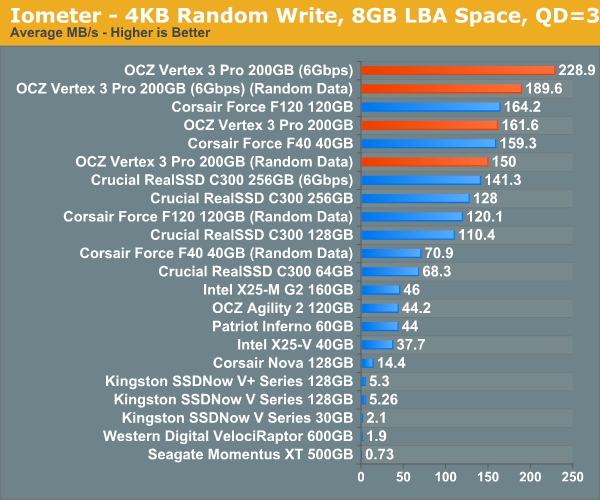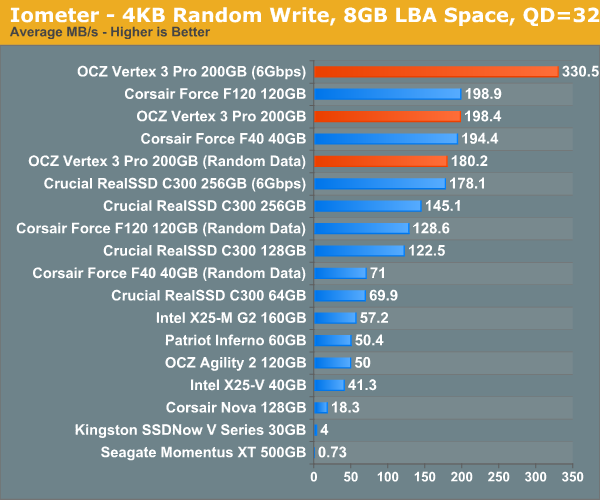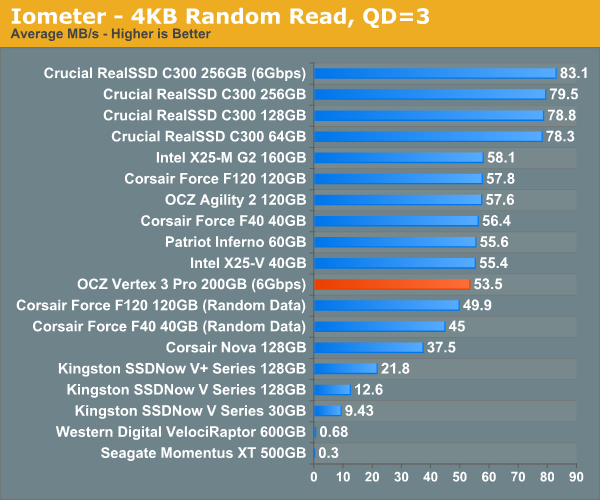OCZ Vertex 3 Pro Preview: The First SF-2500 SSD
by Anand Lal Shimpi on February 17, 2011 3:01 AM ESTThe Test
Note that I've pulled out our older results for the Kingston V+100. There were a couple of tests that had unusually high performance which I now believe was due the drive being run with a newer OS/software image than the rest of the older drives. I will be rerunning those benchmarks in the coming week.
I should also note that this is beta hardware running beta firmware. While the beta nature of the drive isn't really visible in any of our tests, I did attempt to use the Vertex 3 Pro as the primary drive in my 15-inch MacBook Pro on my trip to MWC. I did so with hopes of exposing any errors and bugs quicker than normal, and indeed I did. Under OS X on the MBP with a full image of tons of data/apps, the drive is basically unusable. I get super long read and write latency. I've already informed OCZ of the problem and I'd expect a solution before we get to final firmware. Often times actually using these drives is the only way to unmask issues like this.
| CPU |
Intel Core i7 965 running at 3.2GHz (Turbo & EIST Disabled) Intel Core i7 2600K running at 3.4GHz (Turbo & EIST Disabled) - for AT SB 2011 |
| Motherboard: |
Intel DX58SO (Intel X58) Intel H67 Motherboard |
| Chipset: |
Intel X58 + Marvell SATA 6Gbps PCIe Intel H67 |
| Chipset Drivers: |
Intel 9.1.1.1015 + Intel IMSM 8.9 Intel 9.1.1.1015 + Intel RST 10.2 |
| Memory: | Qimonda DDR3-1333 4 x 1GB (7-7-7-20) |
| Video Card: | eVGA GeForce GTX 285 |
| Video Drivers: | NVIDIA ForceWare 190.38 64-bit |
| Desktop Resolution: | 1920 x 1200 |
| OS: | Windows 7 x64 |
Random Read/Write Speed
The four corners of SSD performance are as follows: random read, random write, sequential read and sequential write speed. Random accesses are generally small in size, while sequential accesses tend to be larger and thus we have the four Iometer tests we use in all of our reviews.
Our first test writes 4KB in a completely random pattern over an 8GB space of the drive to simulate the sort of random access that you'd see on an OS drive (even this is more stressful than a normal desktop user would see). I perform three concurrent IOs and run the test for 3 minutes. The results reported are in average MB/s over the entire time. We use both standard pseudo randomly generated data for each write as well as fully random data to show you both the maximum and minimum performance offered by SandForce based drives in these tests. The average performance of SF drives will likely be somewhere in between the two values for each drive you see in the graphs. For an understanding of why this matters, read our original SandForce article.

Random write performance is much better on the SF-2500, not that it was bad to begin with on the SF-1200. In fact, the closest competitor is the SF-1200, the rest don't stand a chance.
Many of you have asked for random write performance at higher queue depths. What I have below is our 4KB random write test performed at a queue depth of 32 instead of 3. While the vast majority of desktop usage models experience queue depths of 0 - 5, higher depths are possible in heavy I/O (and multi-user) workloads:

Ramp up the queue depth and there's still tons of performance on the table. At 3Gbps the performance of the Vertex 3 Pro is actually no different than the SF-1200 based Corsair Force, the SF-2500 is made for 6Gbps controllers.











144 Comments
View All Comments
Chloiber - Thursday, February 17, 2011 - link
It's correct, Anand answered the exact same question already on page 1/2 of the comments.7Enigma - Thursday, February 17, 2011 - link
Yup, saw that on my second read through. A little clarification in the article would have made it a bit more explainable but at least the numbers are right.teldar - Thursday, February 17, 2011 - link
Hope this gets seen.I used to go to a site frequently for info on drive reliability.
storagereview.com
I don't believe its really being updated anymore. I would love to side you be able to integrate a site like theirs (or theirs completely) into here.
argosreality - Thursday, February 17, 2011 - link
They've been updating the site for the last six months or so with new reviews. Actually, they just reviewed the new Vertex2 drives with 25nm flashtomoyo - Friday, February 18, 2011 - link
Ya storagereview is quite alive now. They were dead for over a year, but I'm glad to have another good source of hdd/ssd info again.KenPC - Thursday, February 17, 2011 - link
OCZ needs a distraction - NOWSo serve up a prototype (even without a case yet) drive and get fabulous bench results and lots of press to drown out the behind the scenes downgrading of many of the on-market products.
Yes, this new controller/architecture for this particular prototype is faster. Yes, it appears to be very promising technology in the SSD space.
But now folks will be using THIS prototype review to measure the purchase decisions for drives sold months from now that may/may not have the same performance
MeSh1 - Thursday, February 17, 2011 - link
Wow, thats some tasty hardware :). 400GB @ $1350. The Revo X22 480GB is just under that, hmm..... decisions. Revo Drive uses SF1200 I wonder if they can slap a SF200 on the Revo :)Breit - Friday, February 18, 2011 - link
you can bet on that. ocz will definitely roll out a new revodrive with sf2000 on it when the time comes, trust me. :)geniekid - Thursday, February 17, 2011 - link
Don't know if anyone from AT will get this far in the comments, but...1) I like how the beginning of the article rehashes how SSDs work instead of linking back to earlier articles. The redundancy makes it a lot easier to read the article.
2) I think the real world usage of these things is invaluable. Theoretical limits almost never ever mirror real world usage. *Thumbs up*
TrackSmart - Friday, February 18, 2011 - link
I agree completely on the REAL WORLD tests. Looking at the PCMark Vantage scores, it's clear that the incredible speeds of the Vertex 3 will only yield marginal gains in *total system performance* compared to the current crop of SSDs (Agility 2, Vertex 2, etc). Hopefully the price of the new drives will be similar to the old ones. Or lower, forcing even more affordable pricing on the existing, fast-enough models.